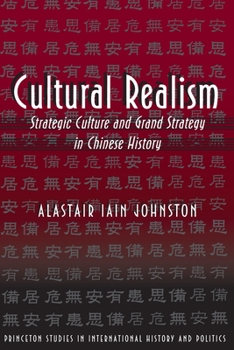Cultural Realism: Strategic Culture and Grand Strategy in Chinese History
(Part of the Princeton Studies in International History and Politics Series)
Select Format
Select Condition 
Book Overview
Cultural Realism is an in-depth study of premodern Chinese strategic thought that has important implications for contemporary international relations theory. In applying a Western theoretical debate... This description may be from another edition of this product.
Format:Hardcover
Language:English
ISBN:0691029962
ISBN13:9780691029962
Release Date:October 1995
Publisher:Princeton University Press
Length:352 Pages
Weight:0.25 lbs.
Dimensions:1.1" x 6.0" x 9.0"
Customer Reviews
3 ratings
Great book.
Published by Thriftbooks.com User , 16 years ago
Johnston's presentation of a thorough research is clear and precise. It is a great acquisition for those who are interested in Chinese history and strategic culture, but also for those who work with strategic culture writ large.
Very Well Argued
Published by Thriftbooks.com User , 23 years ago
While admittedly not a formal scholar of Chinese history, I was drawn to read this book by a lifelong interest and association with China, and found it quite interesting and well-argued, if somewhat technical.The book argues that a textual analysis of older Chinese literature, using the "Seven Military Classics" (historically important Chinese military texts), leads to the conclusion that the Chinese have essentially two distinct mentalities regarding the use of violence. On the one hand is the traditional view -- here termed the Confucian-Mencian view -- of a cultural aversity to the use of force. Johnston claims that this view, while perhaps a valid perspective in Chinese history, is nevertheless exaggerated in the face of actual historical evidence.Johnston, a professor at Harvard, makes extensive citations of previous research, and his arguments are generally speaking, logically well-structured. He is very careful to draw conclusions on the basis of evidence he has previously provided in a step-by-step, almost connect the dots manner.My only criticisms relate to two factors: First, some of the language used seems somewhat overblown. I understand that this is an academic text, and I am not taking issue with the necessary complications that such texts entail. However, on a whole the work is somewhat difficult to read, sometimes unnecessarily. I was stopped on several instances by words which had simply been fabricated, more complex versions of already pre-existing and less obscure terminology.My last point is admittedly a somewhat weak one, since I do not have the exposure to purely academic work with which Johnston assumes familiarity. However, the bulk of the book relies on, as mentioned above, an analysis of the Seven Military Classics, whereupon Johnston concludes that none of the texts display an adversity to violence. This conclusion is often drawn from the lack of other potential methods of conflict resolution in the texts. Yet from my familiarity with the Classics, they are essentially war manuals, books for providing knowledge of military situations. Thus it strikes me as somewhat leading to assume that these works should include such alternate methodology, in the same sense that one would not expect a dissertation on the bioethics from a surgical machine's instruction manual. If you required the information from these books, it is possible that other methods of resolution had been tried and had failed. This possibility was as far as I can tell either not mentioned in the book, or disregarded.
Eye opening in light of current events.
Published by Thriftbooks.com User , 25 years ago
I set about several years ago to improve my understanding of China. I have previously submitted reviews with China as subject, "The Coming Conflict with China" and "Year of the Rat: How Bill Clinton Compromised U.S. Security for Chinese Cash". I will soon add a review of " Betrayal: How the Clinton Administration Undermined American Security " by Bill Gertz. However, "Cultural Realism: Strategic Culture and Grand Strategy in Chinese History" is perhaps most important for providing that historic foundation of Chinese culture that makes these other books immensely more understandable and frightening in the light they shed.Cultures do not change dramatically over time, especially a culture as old as is China's. One of the widely held beliefs about Chinese culture is that in it's strategic thinking; how to handle conflicts with other nation-states, the use of force, and the nature of the enemy, China has been largely passive and defensive. Not so contends Johnston. By a systematic and painstaking review of the "Seven Military Classics", a compilation of the military writings of ancient China, Johnston satisfactory demonstrates the realpolitik found in Chinese thinking. A set of operational strategic maxims that "argues that the best way of dealing with security threats is to eliminate them through the use of Force". This of course based on gaining the abilities and upper hand to do so.Taken as a whole this book argues for a reassessment of the Western world's view of China as something of a gentle giant. Far from being gentle, this book argues for a China ready to use force to protect it's national interest. And a certain sensitivity to what may be constituted as a threat to national interest. For the United States, this book offers a clear blueprint for China's actions to date as our presumed "strategic partner". This book is a must read for our current crop of the China lobby, and should have been a must read for Bill Clinton before he threw open the barn door of U.S. security.






